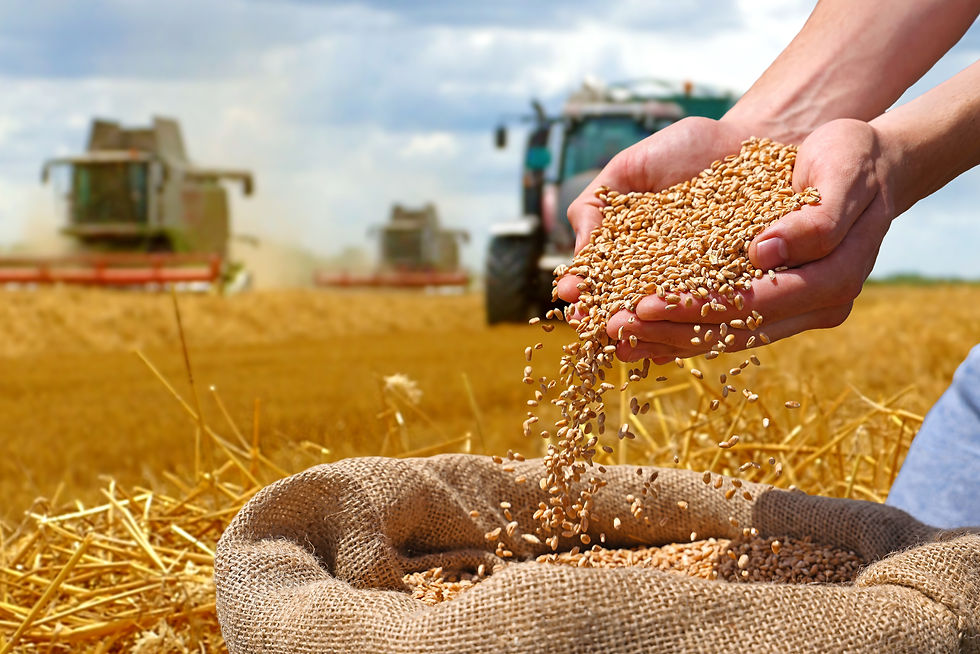What are the four promises of the Word of Wisdom? (D&C 89-92)
- Marci & Eric

- Aug 24
- 10 min read
89:2
The scriptures are written for our spiritual salvation. Their purpose is not for our temporal salvation. Earlier in the D&C, we read, “All things unto me are spiritual, and not at any time have I given unto you a law which was temporal… my commandments are spiritual; they are not natural nor temporal, neither carnal nor sensual.“ This temporal life is obviously very important for us - but that is not to say that there is any part of this world that is enduring. The purpose of revelation, ultimately, is to bless us spiritually.

Having said all of that, there are also temporal blessings connected with revelation. D&C 89 is definitely a good example. There are spiritual blessings connected with the Word of Wisdom but there are also definite temporal blessings. The Lord says as much. “To be sent greeting; not by commandment or constraint, but by revelation and the word of wisdom, showing forth the order and will of God in the temporal salvation of all saints in the last days.”
The Word of Wisdom is meant as temporal protection. This world has a lot of trials and tribulations, we don’t need to add onto those happening naturally by layering on issues with our health and safety. We don’t need to add addiction and Drunk driving and lung cancer to an already difficult mortal experience.
It is interesting that the word of wisdom is not meant as a “commandment or constraint.” It appears that it has become that. We are commanded and constrained. If we violate the word of wisdom, we lose our temple recommend. How did this happen?
The word of wisdom followed a pattern we see with many commandments:
1830s–1840s: Introduced as counsel, not enforced.
1850s: Brigham Young urged Saints to live it more fully, but admitted many leaders did not.
1890s: Church leaders (esp. Wilford Woodruff, Lorenzo Snow) began pressing for stricter observance.
1921: President Heber J. Grant made it a firm commandment tied to temple worthiness.
This shows that while it was given originally “not by commandment or constraint,” the prophet, holding priesthood keys, had authority to elevate it into binding commandment status as the Saints were prepared. Wearing garments or paying tithing had a similar progression. It happens, I can accept it and live by what our modern prophets teach us.
89:3-4
All principles taught by the Lord is coupled with a promise. There was a potential blessing in every parable or piece of instruction that came from the Lord’s mouth. The word of wisdom is definitely a great example of a “principle with a promise.” There are certain benefits outlined towards the end of this section that are powerful.
“Given for a principle with promise, adapted to the capacity of the weak and the weakest of all saints, who are or can be called saints.” If we all had strong willpowers, we could drink and not over-drink. We would naturally avoid anything that would damage our body or dull our spirit. However, many of us are weak. If we starting drinking, we would over do it. We would become addicted to it and it would negatively impact our lives - to put it mildly. Since there isn’t a litmus test and a definite line between the strong and the weak, the word of wisdom must apply to us all.
“Behold, verily, thus saith the Lord unto you: In consequence of evils and designs which do and will exist in the hearts of conspiring men in the last days, I have warned you, and forewarn you, by giving unto you this word of wisdom by revelation.” Add to our natural weakness - an environment where companies are constantly strategizing to effectively market their beer, hard liquor, vapes, cigarettes, etc - many of us would succumb to their brilliant campaigns.

In the time of Jesus, there weren’t commercials that effectively illustrate how “fun” your life can be by simply drinking beer. There weren’t movies with clever product placement to make smoking seem cool. There weren’t magazine adds that push the latest invented drug. All of these companies are truly “conspiring” to sell more product - regardless of the negative effects that their product is having on the population. It may have been hard for young Joseph to foresee today’s marketing environment - I’m glad he trusted the Lord’s forewarning.
89:5
The first thing that the Lord warns us about is “wine or strong drink.” This may have been a surprise for Joseph Smith as we have all read that Jesus himself turned water into wine to be drank at a wedding. How could something that Jesus did every be considered bad? As I mentioned, the world is a much different place now as opposed to the meridian of time. There were no drunk drivers after the wedding feast…

I should say that drinking wine or strong drink isn’t inherently sinful. Jesus did not sin by drinking wine. Our friends who aren’t members of the church are not sinning when they drink. It’s very important that we don’t view them that way. The word of wisdom applies to us saints. We have been asked to do this. If we ignore the word of wisdom, our spiritual development is limited. We are rebelling against something that we know to be true. This has an effect on our spirit. Members of other faiths have no such knowledge or testimony of the word of wisdom. Their partaking is not rebellious because they are ignorant of the principle. Their spiritual development isn’t limited in any way by drinking.
89:7-9
There are a few things that the Lord warns us of in these verses:
Strong drink (again)
Tobacco.
Hot drinks. (Joseph Smith himself clarified this as meaning tea and coffee)
Tea and coffee are stimulants and addictive. It’s interesting to me that the church doesn’t restrict drinking Coke and other soft drinks that contain caffeine which is the same stimulant. I over imbibe Coke myself. It’s something that I attempt to quit regularly. I’m still working on it.
89:10-11
There are a couple of recommendations outlined in this revelation. “And again, verily I say unto you, all wholesome herbs God hath ordained for the constitution, nature, and use of man— Every herb in the season thereof, and every fruit in the season thereof; all these to be used with prudence and thanksgiving.” It’s nice to get a recommendation. Thanks to Marci, I enjoy the taste of many herbs and spices. She is so good at knowing how to use both to amplify the taste of food. I see herbs and spices as a mercy that God has granted us to make our food less bland.
The Lord also specifies fruit as being good. I love fruit! I don’t think I’ve ever met a fruit that I didn’t like. I’m grateful that the Lord gave us sweet and sour fruit - usually perfectly packaged for consumption. Again, I think it’s a mercy that the Lord has given us to give us a level of joy in this harsh world.
89:12-13
“Yea, flesh also of beasts and of the fowls of the air, I, the Lord, have ordained for the use of man with thanksgiving; nevertheless they are to be used sparingly.” This is part of the word of wisdom that I may not be following. I love meat. I don’t like salads unless they have some meat in it. I love barbecuing steaks. I love hamburgers. I love roasted chicken. A meal just doesn’t seem complete without meat.

So, I wouldn’t say that I’m eating meat sparingly. I certainly don’t limit myself to certain times of year. “And it is pleasing unto me that they should not be used, only in times of winter, or of cold, or famine.” The Lord knew where things would go with the consumption of meat. He saw the chicken farms and the cattle slaughter houses. He saw animals kept in small cages so they wouldn’t use their muscles - retaining their tenderness on a plate.
I think we, including me, are overdoing the eating of meat. I should attempt to be less fixated on making meat a part of every meal.
89:14, 16
“All grain is ordained for the use of man and of beasts, to be the staff of life, not only for man but for the beasts of the field, and the fowls of heaven, and all wild animals that run or creep on the earth.” Grain is uniquely elevated in the word of wisdom. Calling it the “staff of life” is significant. It sounds like the basis of our diet. What is made of grain? Grains are seeds of grasses, and across cultures they’ve been the basis of diets for thousands of years. Common ones (according to ChatGPT) include:
Wheat – bread, pasta, crackers, tortillas, baked goods.
Rice – white, brown, jasmine, basmati; eaten plain or as a base for stir-fries, curries, sushi, etc.
Corn (maize) – cornmeal, tortillas, polenta, popcorn, cornflakes, cornbread.
Oats – oatmeal, granola, oat flour, muesli.
Barley – soups, stews, cereals, barley bread.
Rye – rye bread, crackers.
Millet, quinoa, amaranth, spelt – often used in porridges, flatbreads, or as rice substitutes.
Prepared foods – breakfast cereals, noodles, pastries, pita, naan, dumplings.
Calling grain the “staff of life” is powerful:
A staff supports, strengthens, and upholds.
Grains have upheld civilizations physically for millennia.
Spiritually, relying on the Lord’s “ordained” provision through grain is a reminder that He provides for both body and soul.

I’m glad to be reading this section right now as a reminder to myself to eat better. “All grain is good for the food of man; as also the fruit of the vine; that which yieldeth fruit, whether in the ground or above the ground.” I think this verse is emphasizing how our diets should be balanced.
89:18-21
Now the promises: “And all saints who remember to keep and do these sayings, walking in obedience to the commandments,
Shall receive health in their navel and marrow to their bones;
And shall find wisdom and great treasures of knowledge, even hidden treasures;
And shall run and not be weary, and shall walk and not faint.
And I, the Lord, give unto them a promise, that the destroying angel shall pass by them, as the children of Israel, and not slay them. Amen.”
First, it’s interesting that in verse two, this word of wisdom is introduced not as a “commandment or constraint.” But in verse 18, it introduces the blessings as those for the obedient to “the commandments.” I think that the commandments listed in this verse are talking about the overall body of commandments from the Lord. If I am obeying the word of wisdom but are breaking the other commandments, these blessings promised in these verses wouldn’t be given.
The four specified blessings can be summed up on four words:
Health: The Lord promises we’ll have strength and vitality if we live this way. “Health in the navel and marrow to the bones” basically means our bodies and spirits will be energized and strengthened. It doesn’t mean we’ll never get sick, but we’ll have a kind of extra resilience.
Wisdom and knowledge. Keeping the Word of Wisdom clears our minds and hearts so we can receive revelation more easily. The “hidden treasures” are those spiritual insights and personal answers that the Lord gives when we’re living in tune with Him.
Endurance. When it says we’ll “run and not be weary,” it’s not just talking about physical energy. It’s about being able to keep going in life and discipleship without giving up. Obedience gives us endurance — the ability to handle more than we could on our own.
Divine protection. The promise that the “destroying angel shall pass by” ties back to the Passover. For us, it means the Lord gives us spiritual protection and sometimes even physical protection when we follow Him. It’s not a guarantee that nothing bad will happen, but it’s an assurance that we’re under His watch and care.

We need these gifts to successfully navigate our lives. The word of wisdom truly is a principle with a promise. We can’t do this successfully without each and every blessing coming from the word of wisdom. Consider what your life would be like without strength in body and soul? What if you didn’t have clarity of mind and the ability to receive revelation? What if you didn’t have physical and spiritual endurance? What if we forfeit divine protection?
As for me, I’ll be living according to the word of wisdom.
90:5
“And all they who receive the oracles of God, let them beware how they hold them lest they are accounted as a light thing, and are brought under condemnation thereby, and stumble and fall when the storms descend, and the winds blow, and the rains descend, and beat upon their house.” In the not too distant past, I was guilty of holding what our prophets and apostles and leaders “as a light thing.” I watched one day of conference and didn’t refer back to them in the six months between sessions. Much of the time, my listening to conference looked a lot like sleeping.
I can say that I’ve repented of this. While I am still known to doze off during a talk, I listen to all sessions of conferences frequently in between sessions. I refer to what they say regularly. The wisdom and insight that I receive from truly studying what they say has blessed my life in many, significant ways.
We should recognize that these are the Lord’s mouthpieces and are saying things that we need to know. We are so blessed to have living “oracles” who can give us specific direction about what is happening in the here and now.
As I said, I’m much better now at truly striving to understand what our leaders are saying. That’s not to say I could do much better. I know that the storms will descend and the winds will blow in my life - I should not take for granted what a living prophet has to say.
90:24
Our lives are all filled with a mostly homogenous mixture of good and bad. Most of us enjoy the easy, fun time and dislike the hard, challenging times. But, if we’ll follow what is said in this verse, it’s possible that we can make every experience - good or bad - work for our benefit.
“Search diligently, pray always, and be believing, and all things shall work together for your good, if ye walk uprightly and remember the covenant wherewith ye have covenanted one with another.” We must regularly and earnestly study, we must pray sincerely and regularly, we must have faith in Christ no matter what. If we do these things and proceed in faith, it won’t matter if you’re struggling or sailing - there are things to be learned in every condition.
91:1
“Verily, thus saith the Lord unto you concerning the Apocrypha—There are many things contained therein that are true, and it is mostly translated correctly;” I haven’t spent any time studying the apocrypha but I should. Marci is currently listening to some podcasts and it sounds really interesting.
There are good and valuable things found in the world that aren’t a part of the standard works. The books currently a part of the standard works will always be my primary source for instruction and inspiration. But that does not mean that I shouldn’t seek wisdom wherever I can find it.




Comments